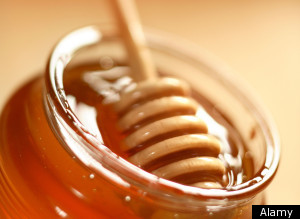The next time you find yourself in the honey aisle of your grocery store, debating between a pricy premium, artisanal honey and the store-brand nectar contained in a plastic bear, you might want to think twice before choosing based on price.
That's because a searing investigation of the honey market by Food Safety News found that 76% of all honey bought at grocery stores were treated with a process called "ultra-filtration," which removes not only impurities like wax, but also all traces of pollen. And of the types of brands at grocery stores, the ones that were far-and-away the most likely to be ultra-filtered were generic brands.
There are issues with ultra-filtration in general -- many believe that pollen, and other so-called "impurities," are actually beneficial to human health, and make honey a better choice than rival sweeteners like sugar. And there doesn't seem to be any serious benefit to the process; it's expensive and doesn't significantly improve shelf-life, even though some manufacturers claim it does…
References
- ^ Huffington Post (www.huffingtonpost.com)
